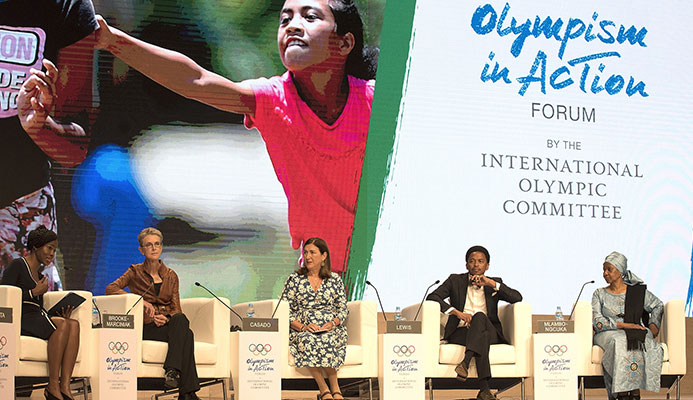“CHANGE LIES IN ALL OF US.” THAT’S HOW EVELYN WATTA, VICE-PRESIDENT OF THE INTERNATIONAL SPORTS PRESS ASSOCIATION, SUMMED UP THE CONVERSATION AT THE OLYMPISM IN ACTION FORUM “WOMEN IN SPORT” SESSION ON HOW SPORT CAN BE A CATALYST FOR EMPOWERING WOMEN AND GIRLS.
The focus of the panel was a discussion of the challenges still facing girls and women in sport, and how sport can not only empower females but also help produce tangible results when it comes to gender equality and greater inclusion and diversity.
For example, the Youth Olympic Games kicking off in Buenos Aires this weekend will be the first fully gender-balanced Olympic event ever. This builds on forward momentum from the last few Games and is expected to continue, with near total gender equality—at almost 49 per cent female representation— forecast for the Olympic Games Tokyo 2020.
But equality, while a highly visible and immediate indicator of progress, is only one part of the equation. More women and girls need to feel empowered to participate and continue participating in sport from a young age, and this is still an enormous challenge in many parts of the world.
THERE ISN’T A COUNTRY IN THE WORLD THAT HAS ATTAINED GENDER EQUALITY, BUT WITH LEADERSHIP AND DETERMINATION, YOU CAN OUTPERFORM SOCIETY, WHICH IS WHAT SPORT DOES
Phumzile Mlambo-Ngcuka
UNITED NATIONS UNDER-SECRETARY-GENERAL AND EXECUTIVE DIRECTOR
IOC Gender Equality Review Working Group Chair Marisol Casado —also President of the International Triathlon Union—spoke about the work done on gender equality in recent years, saying, “In the last ten years, even five, we’ve made huge progress.” She also specifically noted the year-long efforts of the Working Group, which recently made 25 detailed recommendations in five main areas: governance, human resources, funding, sport and portrayal.
THE OLYMPIC FAMILY UNDERSTANDS THIS IS SOMETHING VERY IMPORTANT, AND THAT WE SERVE AS AN IMPORTANT ROLE MODEL.
In fact, parity and equality make a big difference not just in the ranks of athletes, but also in the administration of international sport. Simply put, there still need to be more women in leadership roles, though significant progress continues to be made. Brian Lewis, President of the Trinidad and Tobago Olympic Committee and Caribbean Association of National Olympic Committees (CANOC) and member of the IOC Working Group, said, “Men have to give way to allow more women at the table… they have to also have the vision and commitment to gender equality and have to decide that they will mentor women.”
There are currently three women up for election for IOC Membership at next week’s IOC Session, and the number of female members, 29, has increased by 25 per cent in the last four years. The number of women in IOC Commissions has been increased to almost 43 per cent of the total membership. This is an increase of 98 per cent since 2013.
According to a study at EY, 94 per cent of women in leadership positions in the C-Suite today played sport. “Sport equips you as a woman to get to the highest level of business or leadership,” said the Global Vice-Chair of Public Policy at EY and Founder of the EY Women Athletes Business Network, Beth Brooke-Marciniak.
Not just in business but in so many other areas, progress in gender equality in sport can have a ripple effect on society at large.

